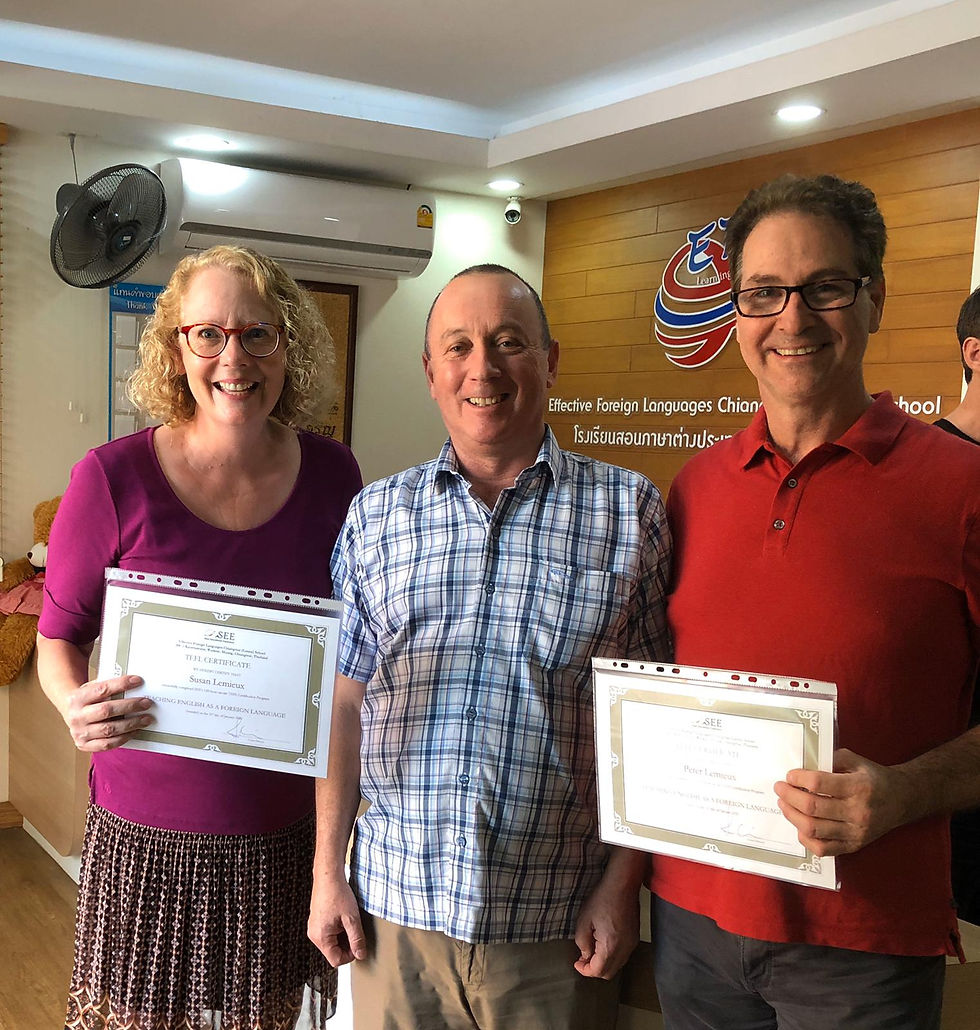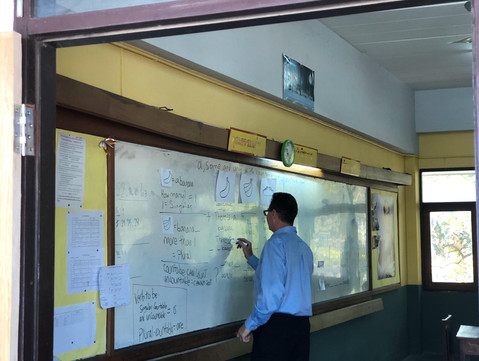SURVIVAL THAI- CULTURE, LANGUAGE, AND DAILY LIFE
- Feb 2, 2020
- 5 min read
Updated: Feb 3, 2020
WE DID IT!!! We are now officially ESL certified teachers! Unemployed, sure … but fully certified!

Its been a tough month – new country, new language (I’m talking English grammar not Thai!!), and a new profession that was completely outside of our comfort zone. Despite this, I am so incredibly proud of both of us. We not only survived, but I think we did a pretty good job overall, learned a ton, and met some amazing people we were able to laugh with as we all went through this very intense experience. We successfully taught 6 different English lessons to students ranging in ages from 3 (I can’t get the song “Baby Shark” out of my head … I dare you to look it up on YouTube) to students in their late 20’s. Now the job search begins …
Before we fully jump into that though, I wanted to share some of the “Survival Thai” that we covered as part of the course. This included insights into culture/Buddhism, daily life, and language. I found it all totally fascinating.
BUDDHISM (for Dummies)
95% of all Thai people are Buddhist, Buddhist temples are everywhere (think Tim Hortons locations for Canadians), and Buddhist monks, in their bright orange robes, are a very common sight. Almost all young males spend some time as monks early in their lives. In very simplistic terms, there are 3 key principles to Buddhism (I apologize in advance for my overly simplistic summary to anyone who is Buddhist or has studied this in depth):
1. Karmic Law (for every action there is an equal & opposite reaction)
Buddhist believe that you create the energy that you experience. If your intention is sincere & selfless you create positive energy; if your intention is insincere & selfish there will be payback one day.
The life you are born into is based on your previous karma. When you die, your past energy stays with your soul. Its there for your next reincarnation.
2. Reality is now - the past and the future are not real
Ahh … that explains some of the lack of planning here.
Your current life is the one you are intended to live- so not a lot of stress over current status
3. Reactions cause your misery
Thais don’t generally get angry or frustrated in their daily lives. They have an expression “mai pen rai” which means no problem, its ok, whatever. A calm/cool/relaxed approach to life is the norm (Peter!), with kindness, respect & appreciation of others highly regarded.
Assertiveness is considered rude. There is an expression “soft rain over a long period of time can change the form of the hard rock”. Note to self: I may have to try that!
DAILY LIFE- A FEW RULES
Public displays of affection should be avoided (there was a recent news article about a Grab driver who called the police because a couple was kissing in the backseat of his car …!!)
Discussion of contentious subjects is avoided (Vince!)
Astrology influences many decisions made by Thais (who to marry, when to marry, etc.). If astrologist says no it's not in the cards, it's game over. Eric/Marie, I checked... you are good.
Eating is done with a spoon and fork (chop sticks... wrong country)
Never point your feet at anyone. Feet are dirty & disgusting (note- don't tie your hiking boots to your knapsack and put it in the overhead bin on the bus).
A woman touching a monk is taboo. Monks don't accept gifts directly from women. You have to place gifts on the ground for the monk to pick it up from there.
Heads are the seat of the soul so can't be touched (exception for children)
NEVER step on Thai money- the king's head is on it.
Amulets give you power. Thai tattoos give you symbolic protection. Black magic is accepted.
EVERYONE shows up for work even if they are sick (I've seen a lot of masks in the last few weeks... no, not Coronavirus). If they don't show up a colleague will be asked to fill in for them, and they don't want to put a burden on someone else (creates bad karma).
Conflict & criticism is avoided. You probably won't know if someone is annoyed with you though!
Thailand is the land of smiles (although I am told a smile can mean many, many different things - not all of them expressed given that avoidance noted above).
Thais call it like they see it (i.e. you are tall, fat, bald). As long as their intention is positive, they are not insulting you, just being factual... hmm?
Karaoke is taken seriously here- and being able to carry a tune seems to be a prerequisite. Peter gets full marks here for enthusiasm despite lacking the prior mentioned skill.

HIERARCHY
Thailand is a very hierarchical society, and not everyone is created equally. Your age, occupation, place in family/society will dictate how much “respect” you are given by others and how you show that respect.
The Thai greeting, the “waai” is done differently depending on whether you are the “Pi’ (the more senior or higher regarded person), the Nong (the more junior person), or a peer in any given relationship. How far you bend down, how the gesture is executed, who initiates it, and whether you respond to the greeting all depends on your relationship to the other person. A bit confusing, but we don’t want to get it wrong when we start applying for jobs!
Culturally, Thais are brought up to not say no to their pi. Children don’t say no to parents, students don’t say no to teachers, employees don’t say no to bosses. If they really don’t want to do something that is being asked of them, they will just avoid that situation altogether.
LANGUAGE
I found it fascinating to learn that there are 5 tonal sounds to the Thai language – and the tone you use when you speak can change the meaning of the words. For example, if you say “maa” with a flat tone that means “come,” but if you say it with a rising tone it means “dog” and with a high tone it means “horse.” Sounds complicated, but apparently it’s an easier language to learn than English.
We did learn how to order drinks in Thai (hey, gotta teach with what is most relevant to the students). I can now say “Kor gaa fae yen mai sai nam dtaan, mai sai nohm, sai nam kaeng” - and have a reasonable chance of getting a cold coffee with ice but no milk or sugar. Gotta celebrate the little wins!
So, we are now armed with:
some basic English grammar knowledge
some real life in-class training & teaching experience
a Thai basics cultural & daily living survival guide
a brand new shiny TEFL certificate
a new Thai bank account - I signed an 8-page legal document and I only recognized 2 words on it: “Susan” and “Lemieux”. I hope I didn’t sign away my first-born child!?!
and knowledge of how to order drinks in the local language.
What more could we need? We are all set to continue to the next stage of this amazing adventure … to become productive tax paying members of our adopted country, Thailand. In the wise words of Dr. Seuss...

Love to all,
Susan
Check out the Survival Thai photo gallery for daily life photos from our first month here.
.png)

















Incredible! Love the updates. Keep them coming.
Congratulations. What a rewarding and exciting direction for both of you. I had no idea you and Pete made this decision. I wish you good health, great adventure and many many good rewards,
LOVE it all. SO AMAZING!!! Love everything you are learning also. Keep it coming I find it fascinating. XOXOOXOX
Susan and Pete, I am so very proud of you. My head was spinning just reading all the cultural need to knows. This advise will so come in handy when Vince and I come in December. Oh the adventures you will have...can’t wait to hear all about your experiences.